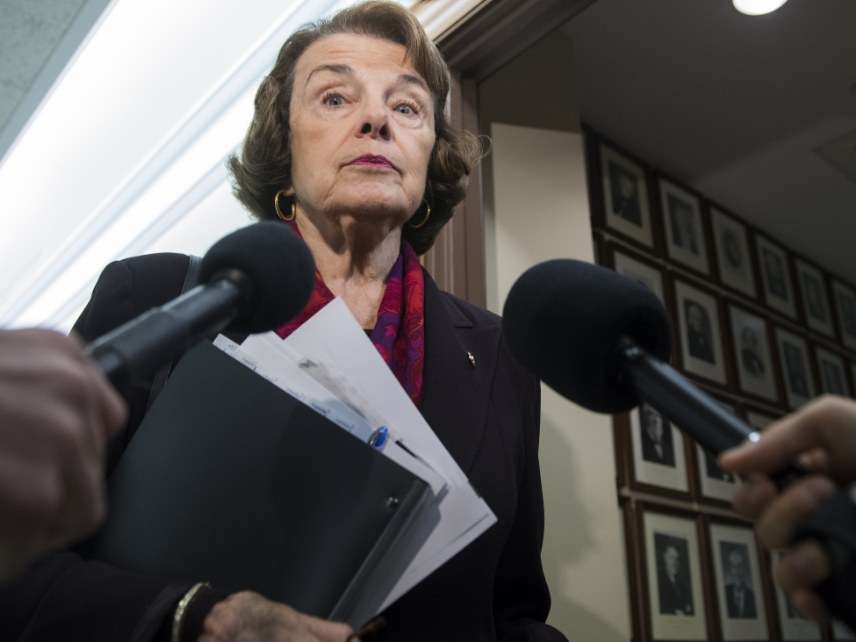Dianne Feinstein Ignores GOP Lawmakers, Blames #ReleaseTheMemo on Russians and Social Media Instead
Any excuse to try to censor the internet

Trust Sen. Dianne Feinstein (D-Calif.) to try to turn a political controversy into an excuse to censor social media.
A bunch of Republican lawmakers have been rallying around a classified memo by House Intelligence Committee Chair Devin Nunes (R-Calif.). The memo purports to show FBI abuses connected to the secret surveillance of people involved with Donald Trump's presidential campaign. The push to declassify the document was national news last week, complete with a hashtag campaign, #ReleaseTheMemo. It was discussed by every major news outlet. Several GOP lawmakers tweeted the hashtag.
Feinstein and Rep. Adam Schiff (D-Calif.) are upset because a bunch of Russian-operated Twitter accounts may have jumped on this and attempted the magnify the hashtag campaign's reach. The two of them have sent a letter to Twitter and Facebook pretty much demanding that they investigate the extent of the Russian involvement in the hashtag campaign. And they want a response in three days:
If these reports are accurate, we are witnessing an ongoing attack by the Russian government through Kremlin-linked social media actors directly acting to intervene and influence our democratic process. This should be disconcerting to all Americans, but especially your companies as, once again, it appears the vast majority of their efforts are concentrated on your platforms. This latest example of Russian interference is in keeping with Moscow's concerted, covert, and continuing campaign to manipulate American public opinion and erode trust in our law enforcement and intelligence institutions.
Feinstein is confusing a symptom for a problem, as politicians often do when they have agendas to pursue. It's absurd to hold Russia responsible for the hashtag in any meaningful sense, given that Republican lawmakers were openly, overtly screaming it from the rooftops, on Twitter, and in front of every news camera they could see. A source familiar with how Twitter works told The Hill that the growth of the hashtag appeared to have happened organically. If Russian trolls and bots were involved, they were at most magnifying a conflict that was already underway. They didn't set this fire, and they weren't the chief force spreading it.
Feinstein's political machinations here are twofold. She's trying to make the case that the feds must regulate social media because of foreign involvement in American elections; and second, she's using the familiar guilt-by-association logical fallacy to discredit her political opponents.
Feinstein's love of censorship is well known. She flat-out wants to suppress online content that she deems dangerous. This lack of respect for Americans' speech rights and privacy is one of the few things she has in common with Trump.
As for the guilt-by-association issue, it's remarkable how little people on either side are interested in engaging the surveillance issues that undergird this fight and instead want to make it all about attacking or defending Trump. I've already mocked Republicans acting outraged about the Nunes memo because a bunch of them just voted to expand the feds' power to snoop on American citizens for purposes unrelated to terrorism and espionage. On the very same day this hashtag campaign was launching, Trump signed that bill into law.
The discussion of actual surveillance policy got drowned by constant efforts to either discredit Trump (by any silly memes necessary) or to discredit the FBI investigation. What's most obnoxious about Feinstein and Schiff's response here is how it simply does not engage the complaint that the surveillance state might have abused its powers when it snooped on and possibly unmasked the identities of people in Trump's orbit.
Personally, based on my experience covering the federal surveillance apparatus, I doubt the Nunes memo actually reveals illegal conduct by federal officials. That's actually part of the problem—it's too easy for the feds to legally justify secretly snooping. Nevertheless, the Nunes memo should be declassified and released, as should the secret court warrant request that serves as the memo's foundation. Could there be a better example for the American public to be able to pick apart the consequences of our federal surveillance state than by learning exactly how it spied on the staff of a candidate for president?
But no: When Feinstein actually had the opportunity to make surveillance laws better, she abandoned her own amendment and signed on to terrible legislation. And now she wants to make this all about Russian meddling in American elections, and to use that as an excuse for more censorship. We need more sunlight, not more secrecy.
Related: ReasonTV on politicians invoking "fake news" as an excuse to control what people can see on the internet:


Show Comments (73)